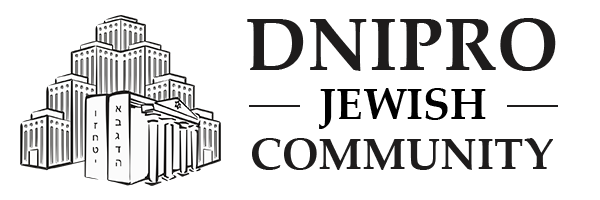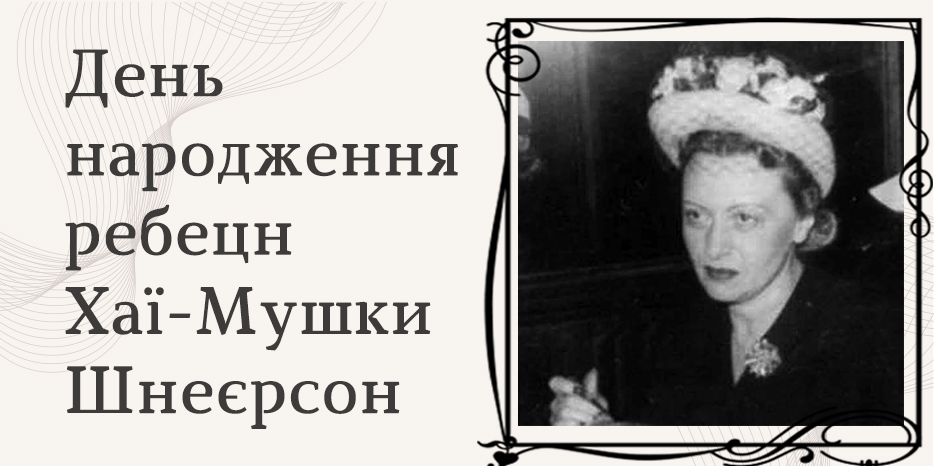On the 25th of the month of Adar, the whole world celebrates the 124th anniversary of the birth of the righteous Rebbetzin Chaya Mushka Schneerson, the wife of the Seventh Lubavitcher Rebbe Menachem Mendel Schneerson and the daughter of the Sixth Rebbe of Chabad.
Although the righteous Rebbetzin Chaya Mushka bore the status of “wife of the King and daughter of the King”, since both her father and husband had the highest title of the Head of the generation – the Lubavitcher Rebbe, she was a very modest person, a faithful companion and reliable support for her great spouse. Rebbetzin Chaya Mushka became a role model for many Jewish women in the current generation, her name is given to daughters in tens of thousands of Jewish families, many charitable and educational institutions around the world bear her name, and the anniversaries of the main events of her life have become honored dates in the Jewish tradition.
We are pleased to reproduce a short biographical sketch of Rebbetzin Chaya Mushka.
Childhood
Rebbetzin Chaya Mushka was born in Babinovichi, a shtetl neighboring Lubavitch, on one of the Shabbos of the month of Adar in 1901, to the family of Rabbi Yosef Yitzchak, the future Sixth Lubavitcher Rebbe, and Rebbetzin Nechama Dina. The name for the newborn was suggested by her grandfather, the Fifth Lubavitcher Rebbe Sholom Dov-Ber. That was the name of her great-grandmother, the wife of the Third Lubavitcher Rebbe Menachem Mendel, nicknamed Tzemach Tzedek.
Chaya-Mushka spent her early childhood in Lubavitch, in the home of her parents and grandfather. Rabbi Sholom Dov-Ber had special feelings for his granddaughter and had a huge influence on her. Already in her declining years, Rebbetzin Chaya-Mushka recalled: “His prayers, full of true feeling, remained in my memory forever. I can repeat every word he said.”
Youth
Chaya-Mushka’s youth fell on the difficult years of the revolution and the Red Terror, when everything connected with Judaism or religion was brutally suppressed.
In 1920, after the death of Rebbe Sholom Dov-Ber, her father became the leader of the Chabad movement, and in those years this meant the leader of the Jewish resistance in general. He founded underground cheders, yeshivas, and mikvahs in the vast expanses of communist Russia.
Chaya-Mushka was a loyal Hasid and her father’s assistant, taking an active part in his risky work. Naturally, not everything is known about this secret activity now, but here is one of the facts: Chaya-Mushka, risking her life, carried candles and food to the underground yeshiva for a long time.
Later, when the family moved to Petrograd, Rebbe Joseph Yitzchak wrote his daughter a power of attorney to receive any official and unofficial mail in his name with the right to delegate it. This meant two things: firstly, Chaya-Mushka was a member of the underground who could be trusted. Secondly, by receiving her father’s mail, she took a risk, and her father believed in her courage and ability to get out of difficult situations.
Marriage
Even in her early youth, on the initiative of her grandfather, Rebbe Sholom Dov-Ber, Chaya-Mushka became the bride of Menachem Mendel Schneerson, a direct descendant of the Rebbe Tzemach Tzedek.
In 1928, after the family managed to escape from Soviet Russia, the wedding took place in Warsaw. The greatest rabbis of Poland, leaders of Hasidic courts, heads of yeshivas, Jewish public figures were present at this wedding, but hardly any of them imagined the real significance of this event: a little over twenty years later, the son-in-law of Rebbe Joseph Yitzchak became his successor, the leader of the Chabad movement, which transformed the Jewish, and not only Jewish, world.
She spared no effort for the sake of kashrut
After the wedding, the young couple lived in Berlin, and after the Nazis came to power, they moved to Paris. Eyewitnesses recall the Schneerson family’s strict observance of the kosher dietary laws in conditions when it was extremely difficult to obtain kosher products.
Rebbetzin Chaya Mushka walked several kilometers to the suburbs of Paris to be present at the milking (the presence of a Jewish observer during milking makes the milk “Jewish”). In Paris, it was impossible to buy matzah that met the Schneerson family’s high requirements for its kosher status, and the rebbetzin personally sorted the wheat, grain by grain, ground it in a hand mill and baked the matzah.
In Burning Europe
After the start of World War II, wanderings began: Vichy, Nice, Marseille… But even having become refugees, the Rebbe and the rebbetzin did not compromise, continuing to observe Jewish laws and customs in the strictest manner.
Later, the rebbetzin recalled one of the episodes of this flight. During a bombing, she had to push a Jew who was hesitating next to her to the ground. “Of course, I pushed him to save his life,” she said with a smile, “but nevertheless, I pushed a Jew. And that meant I had to repent and ask for forgiveness.”
America
In 1940, after much effort by the Jewish community around the world, Rebbe Yosef Yitzchak was rescued from Nazi-occupied Europe and arrived in the United States. He immediately began taking steps to save his daughter and son-in-law. In 1941, Rabbi Menachem Mendel and Rebbetzin Chaya Mushka reached American shores.
In 1950, Rebbe Yosef Yitzchak died. The majority of Hasidim demanded that Rabbi Menachem Mendel succeed him as the leader of Chabad. In 1951, on the first anniversary of the Rebbe’s passing, Rabbi Menachem Mendel publicly delivered his first maamar, the study of the Divine that only a Rebbe can do.
Rebbetzin Chaya Mushka was among those who pressed Rabbi Menachem Mendel to accept the position of Rebbe. She understood what this meant for her: her husband would have no personal time, no longer belong to himself and his family. But she had grown up in a home where self-sacrifice was a daily occurrence. And she understood that her husband was the only person who could continue and expand the work of his father, Rebbe Yosef Yitzchak.
The Rebbe’s Wife
For forty-five years, Rebbetzin Chaya Mushka lived in the world center of the Chabad movement in the heart of New York’s vibrant Jewish district, and yet, despite this, almost nothing is known about her or her life. She never took part in public celebrations or gatherings, never appeared in public. She shopped only in stores where she was not known by sight and was treated like any other customer. There is a known case when she ran into the wife of the leader of one of the Hasidic courts in a store, and she greeted her enthusiastically and told the salespeople that they had the honor… Without finishing her purchase, the rebbetzin left the store and never showed up there again.
The little that we know about Rebbetzin Chaya-Mushka was told after her death by people close to the Rebbe’s family or who worked in his house. They told us, among other things, about the extraordinary relationship between the Rebbe and his wife.
On those nights when the Rebbe was late at farbrengens or receiving people, and this sometimes happened until dawn, the rebbetzin would not go to bed, waiting for him.
In her last years, suffering from a serious illness, she did everything to hide it from her husband – and this despite the fact that Jews from all over the world told him about their troubles and asked for his blessing. One of her close friends asked the rebbetzin why she did not ask her great husband for a blessing for her recovery. “It is important for me not to upset him,” was the answer.
“All Hasidim are my children…”
Rebbetzin Chaya-Mushka was chatting at the table with a Hasidic couple who had come to visit her, while their small children were exploring the house. Returning to the living room, one of the children asked: “Where are your children?” The other, hearing his brother’s question, replied: “You see, there are no toys anywhere. The children must have grown up and left.” The parents were embarrassed to hear such an rude question. The rebbetzin was silent for a moment, hugged the little ones and replied: “You are my children.”
Another time she answered a similar question: “All Hasidim are my children.”
“She, too, can bless”
A group of Chabad women sent Rebbetzin Chaya Mushka a bouquet of flowers for her birthday, along with an envelope with the names of people who needed a blessing. The secretary handed the bouquet to the Rebbetzin and the envelope to the Rebbe. The Rebbe read his wife’s name on the envelope and asked the secretary why he had brought the envelope to him. The secretary explained that it contained a list of people who needed a blessing. “Well, she, too, can bless,” the Rebbe replied, completely seriously.
“Both the Rebbe and his books belong to the Hasidim…”
In 1985, a trial was held for the theft of books from the library of Rabbi Yosef Yitzchak, Rebbetzin Chaya Mushka’s father. The thief, the Rebbetzin’s nephew and the Rebbe’s grandson, believed that he was one of the heirs and took the books by right. The Chabad Union, however, maintained that the Rebbe’s library was not a private collection and that the laws of inheritance did not apply to it. When the Rebbetzin, as one of the main witnesses in the case, was asked who owned the books, she answered with a phrase that became famous: “Both the Rebbe and his books belong to the Hasidim.”
Her Passing
In the last week before her death, the Rebbetzin called all her relatives and friends and had a long conversation with each of them. As if she knew…
Feeling very weak, the Rebbetzin called a doctor. After examining her, the doctor suggested that she go to the hospital for an examination. The next day, on 21 Shevat, the Rebbetzin arrived at the hospital. The doctor on duty began filling out a questionnaire, asking her questions.
The Rebbetzin asked for a drink. They brought her a glass of water. She recited the blessing, took a sip, and turned pale. “Is everything okay?” the doctor asked. She nodded. A few moments later, she turned pale again. The doctor asked again: “Is everything okay?” But she did not answer. It was the evening before 22 Shevat, 1988.
Thousands of people attended the funeral the following day. And soon, Jewish educational institutions for women and girls bearing her name began to open around the world.
Every year in the month of Shvat, in memory of Rebbetzin Chaya Mushka, the World Congress of the Rebbe’s Emissaries is held in New York. Her image serves as an example for them and many other Jewish women.




